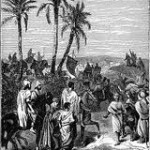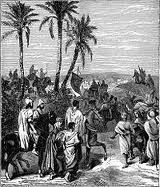 The Jewish people are returning out of a long and painful exile. The healing that needed to occur has been long and arduous. It is a process that will undergo many phases and changes, just as Ezekiel prophesied regarding the return of “the dry bones “( Ezekiel 37).These challenges and changes of our people are mirrored in the lives and journeys of each individual Jew as well. Perhaps an exploration of the rituals and challenges facing an individual in the process of return will give us direction in understanding the challenges facing our people.
The Jewish people are returning out of a long and painful exile. The healing that needed to occur has been long and arduous. It is a process that will undergo many phases and changes, just as Ezekiel prophesied regarding the return of “the dry bones “( Ezekiel 37).These challenges and changes of our people are mirrored in the lives and journeys of each individual Jew as well. Perhaps an exploration of the rituals and challenges facing an individual in the process of return will give us direction in understanding the challenges facing our people.
The Metzorah of this week’s torah portion was also sent into exile.” All the days the lesion is upon him, he shall remain unclean. He is unclean; he shall dwell isolated; his dwelling shall be outside the camp.”(Leviticus 13:46) There are several reasons that bring about this tzaraat affliction, the foremost of them being the sin of slander. Yet all these reasons share one common source and cause. They are all rooted in the sin of arrogance and haughtiness.
In order to ameliorate that self defeating tendency and bring about repentance and purification the Torah tells us that the metzora must dwell alone, “outside the Israelite camp.” (ibid) .This enforced exile and solitude symbolizes on the one hand, both the metzora’s self imposed separation from his own divine purpose and from his connectedness to his fellow Jews. Yet on the other hand, it is in the solitude of exile that the arrogant heart is softened. It is in the banishment and the loneliness that the sparks of the truly repentant heart can ignite and blossom into a true expression of teshuva/ repentance.
What is true of the individual soul is true of the collective soul of the Jewish people.
The exiles of the Jewish people throughout the ages were also a result of arrogance and haughtiness. The tractate of Sanhedrin tells us “Galut is atonement for everything,” (Sanhedrin 37b) and it is in the solitude of this nation’s exile that its arrogant heart is softened and therefore achieves atonement.
Yet then we as a people must contend with the ingredients of redemption and return. Again it is the example of the Metzorah that will be instructive. The ritual that is used to purify the Metzorah includes instructive symbols and metaphors. In this ritual, the process of purification required the bringing of two free living birds together, with a stick of cedar wood, red-dyed wool thread and a branch of hyssop.
One bird is slaughtered and the other one ,after it is dipped in the blood of the slaughtered bird together with the other items , is set free. The strip of red crimson wool represents the sinfulness that will become whitened by repentance , as we see in the book of Isaiah, “though your sins be as scarlet they shall be as white as snow.” (Isaiah 1:18). They will be whitened when we confront them and repair them. Otherwise sins like “the sin of the spies” and “the division of the nation into two warring factions” will continue to haunt us.
In explaining the use of the cedar wood with the hyssop branch , Rashi points to its being symbolic of the vanity and haughtiness that brought about the sin in the first place He explains quoting Midrash Tanchuma that ” because he has exalted himself like a cedar… he should humble himself like a grass( the hyssop bush).
Yet the cedar wood points in another direction as well. King David declares , declares, “The righteous bloom like a date-palm; they thrive like a cedar in Lebanon.( Psalm 92:13, )” In the Song of Songs, the lover is described with the words, “He is majestic as Lebanon, Stately as the cedars” (Song of Songs 5:15). The cedar wood was meant to instruct the returning Metzorah not to lose his “sense of self”. Because the true meaning of humility is not about being broken and unworthy, but to be humble even as one stands straight and tall
Rabbi Simcha Bunim of Peshischa said “A person should have two pockets in his coat. One should contain the saying ” For my sake was the world created.” (Sanhedrin 37a) In the second pocket he should keep the verse “I am but dust and ashes.” (Genesis 18:17).
This is the vessel that G-d truly wants . The vessel that would be worthy of His name . This is the type of vessel that HaShem wants His people to become as well. To be humble and repentant , while at the same time as being courageous and forthright. That will be the only way to combat the physical attacks of our neighbors and the political attacks of those who claim to be our friends. That will be the only way to truly rebuild out of exile.

God loved the Jews but sometime arrogance and pride get in the way and they forgot Him. He needed to remind them but because of His love for His people, he then saves them.
yet even more times it is the arrogance and pride of the nations that want to replace this people that brings about the hardships…Yet it is G-d’s unwavering faithfulness to His promise that will eventually humble those nations
Shalom, Moshe you are a blessing to your children.
Shalom shalom Yerushalayim